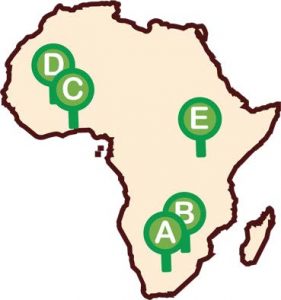H3Africa Collaborative Centers
AWI-Gen 2: Genomic and Environmental Risk Factors for Cardiometabolic Disease in Africans
The Goal
AWI-Gen is working to understand how genes, environment, and lifestyle affect cardiovascular and metabolic health across Africa and to uncover new insights that could help to improve the health of Africans.
The Problem
Due to advances in the field of genetics and genomics, researchers now have the ability to understand how one’s DNA and their environment can play a role in their susceptibility to obesity, hypertension, and diabetes – but only in western populations. African populations have been routinely omitted from this fundamental research, keeping them from accessing basic public health strategies.
Project Strategy
- Survey 12,000 participants across the continent for information regarding lifestyle, environment, and medical history.
- Collect blood and urine samples from participants to measure genomic and metabolic health factors.
- Use this information to explore genetic contributions and gene-by-environment interactions on susceptibility for traits like obesity, hypertension and diabetes.
- Use insights to support development of better prevention and treatment strategies and to inform public policy.
Outcomes to Date
So far, AWI-Gen has found that obesity disproportionately affects women in southern and eastern Africa and is linked to increased prevalence of diabetes. There is regional variation in the prevalence of hypertension, with a lack of awareness of high blood pressure,. Although some are aware of their status and on medication, their blood pressure remains poorly controlled. Genetic studies have shown that people from the same region and ethnicity tend to cluster together, and that there are differences between the people from western, eastern and southern Africa. Geographic isolation and local adaption to their environments may in part account for these differences.
Project Sites
 |
A. South Africa, WITS Health Consortium, University of the Witwatersrand B. South Africa, University of Limpopo C. Ghana, Navrongo Health Research Center D. Burkina Faso, Clinical Research Center of Nanoro E. Kenya, African Population and Health Research Center |
|---|
Non-African Collaborators
USA: Harvard University, Stanford University, University of Colorado
UK: University of Bristol, University of Leicester & Wellcome Trust Sanger Institut

